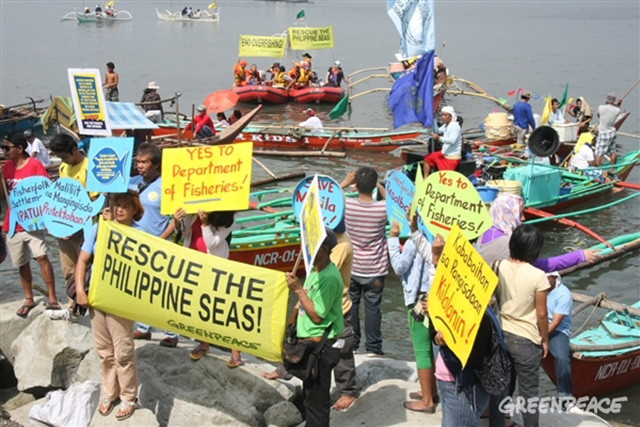SUMMARY
This is AI generated summarization, which may have errors. For context, always refer to the full article.

MANILA, Philippines – The Philippine seas face “unprecedented crisis” due to coastal developments, reclamation projects, garbage dump, and illegal foreign fishing, Greenpeace said a day before the observance of the World Oceans Day on June 8.
As a result of the country’s degraded marine environment, fisherfolk suffer heavily from loss of income, the environmental group stressed.
While fish production increased as a result of greater fishing capabilities, the share of ordinary fishermen in the production pie is barely adequate.
A fishing boat in a town is typically shared by 2-3 workers, which leaves individual profit at P90-P136 a day. Based on estimates from the Bureau of Fisheries and Aquatic Resources, the daily income per fishing boat in the Philippines is pegged at P272.
Fishermen are the poorest among the country’s 9 basic sectors, data from the National Statistical Coordination Board show.
Cost vs yield
The cost of fishing in terms of gasoline and time increased over the years while the resulting yield relative to the cost is at its lowest since the 1950s, Greenpeace said.
The volume of fish caught compared to fishing cost – known in conservation biology as Catch per Unit Effort (CPUE) – is steadily declining in the Philippines.
The decrease in the CPUE in the Philippines indicates overfishing, which results to the depletion of fish stocks and may also explain the over-all increase in fisheries production.
“Kahit mas mura ang isda noon, mas malaki pa rin ang kinikita ng tatay ko noon kapag nagpa-laot kaysa sa akin ngayon,” said Maricel Gacela of Calatagan in Batangas province. (Even if fish was cheaper then, my father’s income was still bigger than what I earn today.)
A single mother to two children, Maricel is one of the two million Filipinos who rely on fishing as their main source of income.
Maricel rents a fishing boat with two others at P500 a week. Half of the P1000 they earn weekly goes to boat rental. The other P500 is divided equally among 3 workers.
“Kapag kumita kami ng P250 a day, malaki na yun,” she said. (If we earn P250 a day, that’s already big.)
“Mas malaki pa nga kinikita ng mga nagbebenta ng isda sa palengke kaysa sa mga mangingisda,” she added. (The profit of those who sell fish in the market is even greater than those who catch fish.)
Poverty and conserving the seas
Local fishermen also bear the consequences of weak maritime law enforcement and poor licensing mechanisms.
The volume of catch of one commercial fishing vessel already equals to that of 65 municipal fishing boats.
The illegal entry of commercial vessels in nearshore fishing grounds, which are supposed to be exclusive for small-scale fishers under the 1998 Fisheries Code, is pervasive.
In addition to competing with large-scale fishing of commercial vessels, local fishermen also share the ocean’s resources with foreign fishing vessels that illegally encroach on Philippine seas.
According to Greenpeace Southeast Asia Oceans Campaigner Vince Cinches, losses are hard to compute due to the absence of baseline data.
Cinches also highlighted the importance of conserving the seas as part and parcel of the poverty-reduction agenda.
“Protecting the marine environment is not just a cause for the middle class,” he said, citing a 2009 study on the need for further integration of poverty alleviation and biodiversity conservation.
“Any near-term gains in reducing extreme poverty will be maintained only if environmental sustainability is also achieved,” the study reads.
The maintenance of livelihoods in coastal populations requires that marine degradation and overfishing be put to a stop.
What can be done
Greenpeace urged Filipinos to join the movement of Ocean Defenders by signing up at www.defendouroceans.org
“All Filipinos are stakeholders of the seas. We must each be part of the solution,” Cinches of Greenpeace said.
Prof Porfirio ‘Perry’ M Aliño of the Unversity of the Philippines Marine Science Institute asked the Philippine government to impose a freeze on the issuance of fishing licenses or permits in order to curb overfishing,
Both Aliño and Greenpeace emphasized the need to effectively implementat existing laws, including the protection of marine sanctuaries and the exclusivity of 15 kilometers of near-shore fishing grounds to small-scale fishers. – Rappler.com
Add a comment
How does this make you feel?
There are no comments yet. Add your comment to start the conversation.